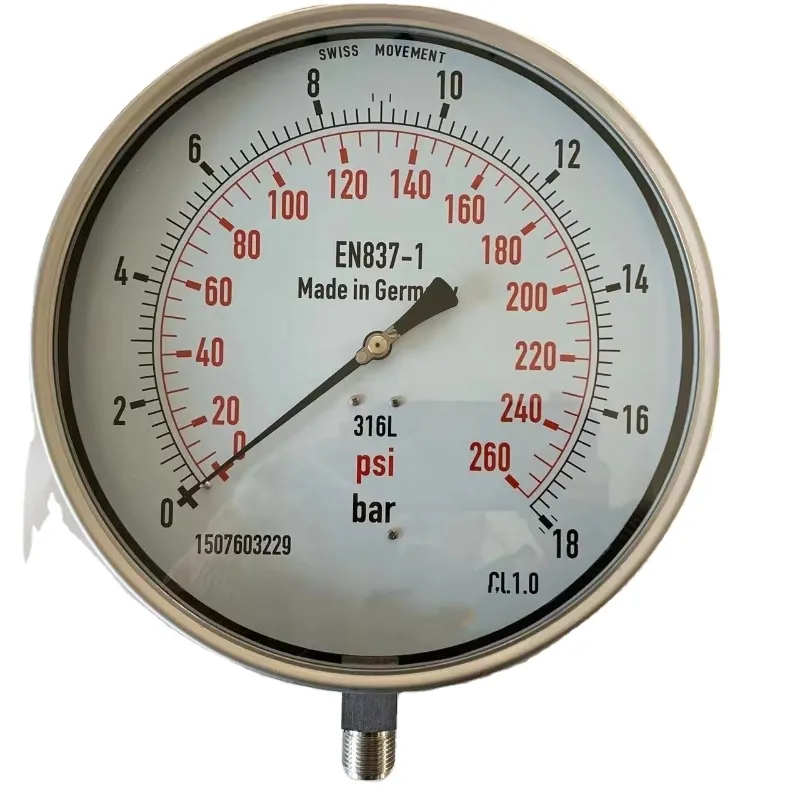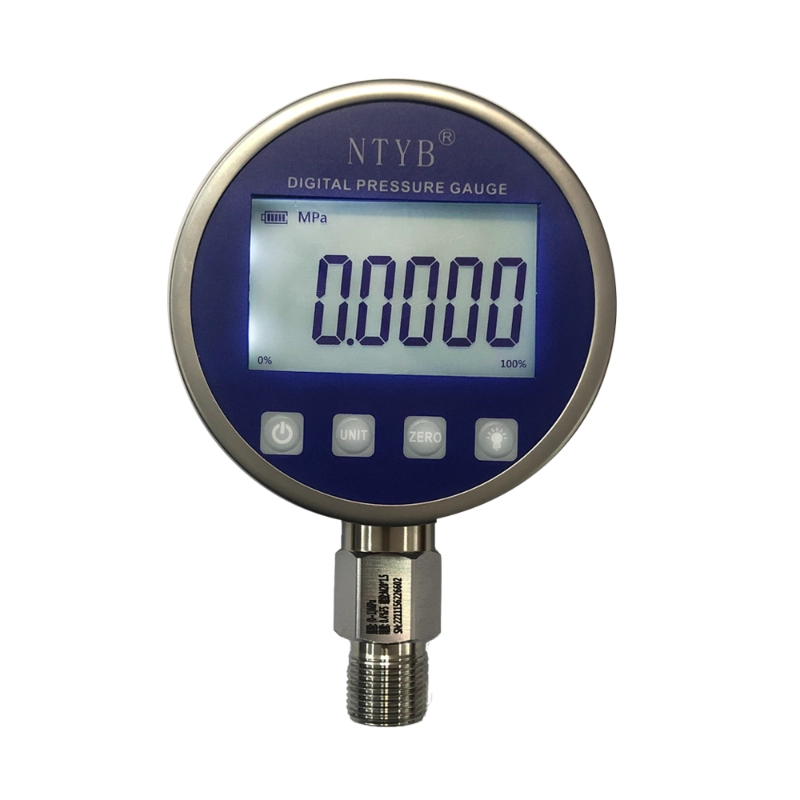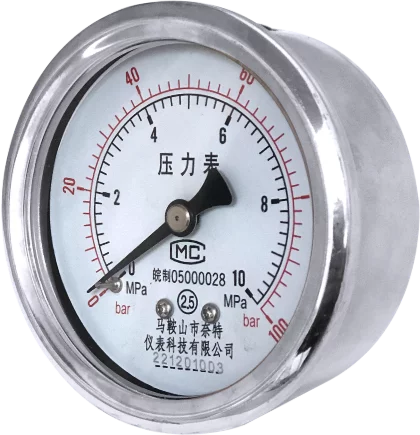Everything You Need to Know About Stainless Steel Pressure Gauges
Release time: 2025-09-16
Stainless steel pressure gauges are commonly used in industrial pressure measurement tools, widely used in the chemical, petroleum, food, and pharmaceutical industries. Their durability, corrosion resistance, and long lifespan make them indispensable equipment in many demanding environments. This article will provide a detailed introduction to the working principles, advantages, applications, and purchasing recommendations of stainless steel pressure gauges to help you better understand this device.
What is a Stainless Steel Pressure Gauge?
A stainless steel pressure gauge is a pressure measurement tool made of stainless steel. It uses mechanical principles to convert pressure into needle displacement via built-in pressure-sensing elements (such as bellows, diaphragms, and spring tubes), which are then displayed on the dial. Due to the special properties of its material, stainless steel pressure gauges can withstand the challenges of harsh environments, such as high temperatures, high pressures, and corrosive media, making them suitable for a wide range of industrial applications.
Working Principle of Stainless Steel Pressure Gauges
The working principle of a stainless steel pressure gauge is similar to that of other mechanical pressure gauges, primarily relying on a metal elastic element to sense pressure. Common stainless steel pressure gauges operate as follows:
- Bellows pressure gauge: The bellows elastically deforms under pressure, driving a mechanism that ultimately displays the pressure on the dial.
- Diaphragm pressure gauge: Pressure acts on a diaphragm, whose deformation is amplified by a lever mechanism, ultimately displaying the pressure on the dial.
- Bourdon tube pressure gauge: The bourdon tube deforms under pressure, driving a needle to indicate pressure.
All of these pressure gauges offer high precision and long-term stability, accurately reflecting changes in fluid or gas pressure within the system.
Main Advantages of Stainless Steel Pressure Gauges
Stainless steel pressure gauges, made of stainless steel, offer many unique advantages:
- High Corrosion Resistance: Stainless steel exhibits excellent corrosion resistance against a wide range of chemical media, including acids, alkalis, oils, and other corrosive liquids and gases, making it suitable for harsh working environments.
- High Temperature Resistance: Stainless steel pressure gauges operate stably in high-temperature environments and are not easily affected by temperature fluctuations, ensuring long-term reliability.
- Rugged Construction: The stainless steel material makes the pressure gauge housing more robust, offering enhanced shock and abrasion resistance, making it suitable for challenging operating conditions such as vibration and impact.
- Long Service Life: Stainless steel pressure gauges offer a long service life, maintaining stable measurement accuracy over time, even in demanding operating environments.
- Easy to Clean: The smooth surface of stainless steel makes it easy to clean, making it particularly suitable for industries with high hygiene requirements, such as the food and pharmaceutical industries.
Applications of Stainless Steel Pressure Gauges
Due to their excellent performance, stainless steel pressure gauges are widely used in various industries, particularly those requiring stringent equipment safety, accuracy, and durability. The following are some typical applications:
- Chemical Industry: Chemical reactors, storage tanks, pipelines, and other equipment require real-time monitoring of pressure changes using stainless steel pressure gauges to ensure production safety.
- Oil and Gas Industry: Stainless steel pressure gauges are commonly used in oilfield extraction, natural gas transportation, and storage to monitor the pressure status of pipelines and equipment, ensuring production safety.
- Pharmaceutical Industry: Stainless steel pressure gauges are used in steam boilers, pressure vessels, and other equipment within pharmaceutical factories to accurately monitor pressure and ensure the stability and hygiene of the production process.
- Food Industry: Food processing, filling, steam heating, and other processes often require stainless steel pressure gauges to monitor system pressure and ensure food safety and production efficiency.
- Water Treatment Industry: In water treatment plants, pumping stations, and other equipment, stainless steel pressure gauges are used to monitor water flow pressure and ensure the normal operation of the water supply system.
- Heating and Air Conditioning Industry: Stainless steel pressure gauges are widely used in boilers, heat exchangers, and air conditioning equipment to monitor pressure and ensure equipment safety.
How to Choose the Right Stainless Steel Pressure Gauge?
When selecting a stainless steel pressure gauge, multiple factors should be considered to ensure accuracy, reliability, and durability. Here are some purchasing recommendations:
- Pressure Range: Selecting the appropriate pressure gauge range is the primary consideration. Ensure that the maximum measuring pressure of the pressure gauge is higher than or equal to the actual working pressure, but not too high, to improve measurement accuracy.
- Temperature Resistance: Select a suitable heat-resistant stainless steel pressure gauge based on the operating temperature conditions. Some models are suitable for high-temperature and high-pressure environments, including steam and high-temperature media.
- Media Type: Select a stainless steel pressure gauge with strong adaptability based on the properties of the measured media (such as corrosiveness and viscosity). Certain types of stainless steel pressure gauges are compatible with corrosive media such as acids, alkalis, and oils.
- Accuracy Requirements: For applications requiring high-precision measurements, choose a high-precision stainless steel pressure gauge, such as a differential pressure gauge or a high-precision pointer pressure gauge, to ensure data reliability.
- Connection Methods: Stainless steel pressure gauges have a variety of connection methods (such as threads and flanges). Select the appropriate connection method based on the installation location to ensure a stable installation.

Maintenance and Care of Stainless Steel Pressure Gauges
To ensure the long-term and stable operation of stainless steel pressure gauges, regular maintenance and care are essential. The following are some common maintenance recommendations:
- Regular Cleaning: Since stainless steel pressure gauges are often used to measure liquids or gases, clean the surface and dial regularly to prevent dirt from affecting the readings.
- Checking for Leaks: Check the seals of the pressure gauge to ensure there are no leaks to avoid environmental contamination or instrument failure.
- Calibration and Testing: Calibrate the pressure gauge regularly, especially in industries requiring high precision, to ensure accuracy.
- Avoid Overpressure: Avoid exceeding the maximum operating pressure of the pressure gauge during use to avoid damage.
- Protective Housing: For workplaces with harsh external environments, protective covers and other devices are used to reduce external impact and corrosion.
Conclusion
Stainless steel pressure gauges, with their excellent corrosion resistance, high temperature resistance, and high-precision measurement capabilities, are an ideal choice for many industrial fields. Through proper selection and regular maintenance, you can ensure the long-term stable operation of your stainless steel pressure gauge, providing reliable pressure monitoring support for your equipment and production systems.
If you are looking for high-quality stainless steel pressure gauges, we offer customized solutions to help you solve all your pressure measurement problems.


